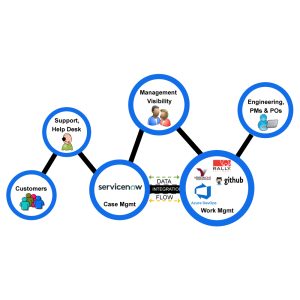Artificial Intelligence (AI) is transforming industries, streamlining business processes, and reshaping decision-making. However, with its rapid expansion comes a pressing concern ethical responsibility. Businesses must ensure their AI models are not only effective but also fair, transparent, and accountable. Ethical AI is no longer an afterthought; it is a business imperative that affects compliance, reputation, and customer trust.
IBM’s watsonx provides a comprehensive framework for enterprises to build, deploy, and govern AI with a strong ethical foundation. This blog delves into AI ethics, the risks of unchecked AI deployment, and how watsonx empowers organizations to create responsible AI ecosystems.
The Growing Importance of AI Ethics in Corporate Environments
AI is an essential component of corporate strategy, but ethical lapses in AI models can lead to biased decisions, lack of accountability, and regulatory violations. Global frameworks such as the European Union’s AI Act, the U.S. AI Bill of Rights, and industry-specific guidelines emphasize the need for responsible AI governance.
The Risks of Ignoring AI Ethics
Failure to address AI ethics can result in:
- Regulatory Consequences: Companies that deploy biased or opaque AI models risk facing legal challenges, financial penalties, and potential restrictions on their AI systems. As regulatory bodies worldwide tighten their scrutiny on AI, businesses that fail to implement ethical AI practices may struggle to operate in key markets.
- Erosion of Consumer Trust: Customers demand fairness, privacy, and transparency in AI-driven interactions. A lack of transparency in AI decision-making can result in skepticism and resistance from users. Ethical AI practices build trust, encouraging greater adoption of AI-driven services.
- Reputational Damage: Negative publicity from AI missteps can undermine a company’s credibility and brand value. High-profile cases of AI bias—such as discriminatory hiring algorithms or unfair loan approvals—can lead to significant backlash and loss of customer loyalty.
- Operational Inefficiencies: Unethical AI can lead to flawed decision-making processes, increasing inefficiencies and costly errors. For instance, biased AI in supply chain management or fraud detection can result in misguided business strategies, harming both profitability and competitiveness.
- Employee Disengagement and Ethical Dilemmas: Organizations that overlook AI ethics may find resistance from employees who feel uncomfortable working with unregulated AI systems. Ethical AI fosters a more responsible workplace culture, ensuring that employees can align their work with ethical business principles.
Understanding AI Ethics: Core Principles and Challenges
Building ethical AI requires a well-defined framework. The fundamental principles include:
1. Fairness and Bias Mitigation
AI should not reinforce or amplify discrimination. Bias in AI can originate from biased training data, flawed algorithms, or systemic societal biases. watsonx helps organizations identify and address biases by analyzing datasets and decision outputs for disparities.
- Bias Auditing: watsonx enables enterprises to assess AI models for hidden biases before deployment.
- Dataset Balancing: Ensures diverse and representative training data to reduce discriminatory outcomes.
- Ongoing Monitoring: Regular AI performance evaluations help detect and rectify bias over time.
2. Transparency and Explainability
A major ethical challenge in AI adoption is the black box effect where AI systems make decisions without clear explanations. Lack of transparency can hinder trust and regulatory compliance.
- Model Explainability: watsonx provides tools to interpret and explain AI decisions in understandable terms.
- Auditability: Businesses can trace AI decision pathways, ensuring accountability.
- Stakeholder Confidence: Employees, customers, and regulators gain insight into AI-driven choices.
3. Privacy and Data Protection
AI models rely on vast datasets, raising concerns about privacy and data security. Ethical AI must respect data ownership and adhere to global privacy regulations.
- Data Anonymization: watsonx enables anonymization techniques to protect user identities.
- Access Controls: Defines who can access and modify AI models, ensuring data integrity.
- Regulatory Compliance: Aligns AI development with GDPR, CCPA, and other privacy laws.
4. Accountability and Governance
AI decisions must be subject to oversight and clear accountability mechanisms. Companies deploying AI should establish governance frameworks that define ethical guidelines and compliance measures.
- Version Control: Tracks changes to AI models, ensuring transparency and accountability.
- Governance Dashboards: watsonx provides visibility into AI operations, risk assessments, and compliance metrics.
- Ethical AI Policies: Organizations can define ethical AI principles and enforce them at scale.
Why AI Ethics Must Be Proactively Embedded
By proactively embedding ethical considerations into AI development, businesses can mitigate these risks while ensuring compliance with evolving legal frameworks. Implementing ethical AI practices provides numerous advantages:
- Improved AI Performance: Ethically designed AI systems are more accurate, reliable, and fair, leading to better business outcomes.
- Competitive Advantage: Companies that prioritize ethical AI can differentiate themselves in the market, attracting more customers and partners who value responsible technology.
- Future-Proofing Against Regulation: By aligning AI strategies with global regulatory trends, organizations can avoid costly rework and legal hurdles as AI laws continue to evolve.
- Sustainable Innovation: Ethical AI fosters long-term innovation by ensuring that AI-driven solutions remain viable, scalable, and socially responsible.
As AI adoption continues to accelerate, companies that fail to establish ethical AI frameworks will face increasing challenges. Organizations must act now to develop governance structures that prioritize fairness, accountability, and transparency, ensuring their AI strategies are not just technologically advanced but also ethically sound.
Watsonx: A Comprehensive Solution for Ethical AI
IBM watsonx is designed to help businesses build, deploy, and manage AI models with robust ethical safeguards. It provides:
1. AI Model Lifecycle Management
watsonx ensures ethical considerations are embedded throughout the AI development lifecycle:
- Data Preparation: Detects and mitigates bias in training datasets.
- Model Training: Ensures models learn from diverse and representative data.
- Deployment Oversight: Prevents AI models from deviating into unethical decision-making.
- Post-Deployment Monitoring: Continuously evaluates AI performance and fairness.
2. Bias Detection and Mitigation Tools
Bias in AI can lead to discriminatory outcomes, affecting customers and employees. watsonx’s fairness and bias-detection tools enable organizations to:
- Analyze AI model decisions for fairness across different demographic groups.
- Adjust model outputs to prevent biased predictions.
- Establish bias mitigation as an ongoing process, not a one-time fix.
3. Regulatory Compliance Features
As AI regulations evolve, watsonx helps businesses stay ahead by:
- Automating compliance checks based on global AI ethics guidelines.
- Providing detailed audit logs to demonstrate adherence to legal requirements.
- Enabling organizations to align AI governance with internal policies.
Implementing watsonx for Ethical AI: A Strategic Approach
To integrate watsonx into an enterprise AI ethics strategy, organizations should:
- Assess AI Risks: Identify where AI is used and evaluate potential ethical risks.
- Establish AI Governance Frameworks: Define ethical AI policies, accountability structures, and compliance measures.
- Utilize watsonx for AI Lifecycle Management: Leverage watsonx tools for model transparency, bias detection, and governance.
- Regularly Audit AI Systems: Continuously evaluate AI fairness, accuracy, and ethical alignment.
- Educate Teams on AI Ethics: Train employees and stakeholders on ethical AI principles and best practices.
Conclusion: Nexright’s Commitment to Ethical AI
At Nexright, we believe that AI should empower businesses without compromising ethical standards. As organizations navigate AI adoption, integrating ethical considerations is essential for sustainable and responsible innovation.
With our deep expertise in AI strategy and implementation, we help enterprises leverage watsonx to build AI systems that are not only powerful but also aligned with ethical principles. From bias detection to governance frameworks, we provide end-to-end AI solutions that ensure transparency, fairness, and compliance.
By partnering with Nexright, businesses can deploy AI with confidence knowing their AI models are responsible, transparent, and built for long-term success. Contact us today to explore how watsonx can transform your AI ethics strategy.




